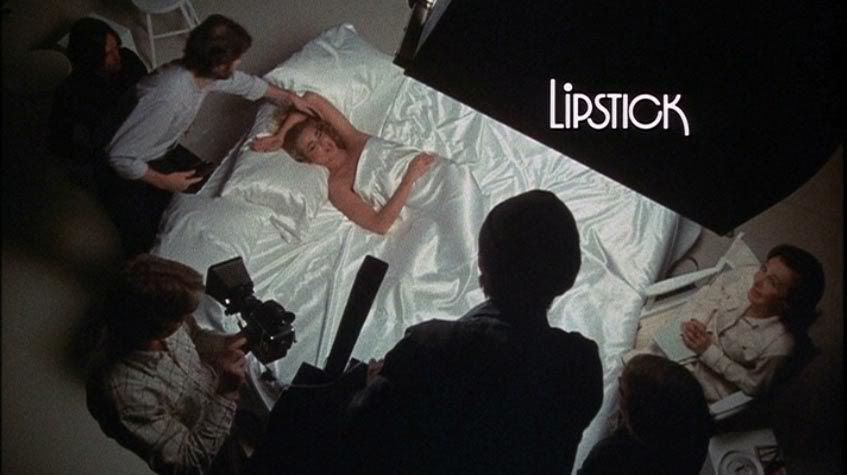I have to admit that I was much relieved when the general critical consensus on the new Jodie Foster vigilante drama The Brave One turned towards the negative. Not because I have any antipathy for the actress—who I believe is pulling off a trick I think should be called The Sarandon, wherein an actress bucks convention and becomes far sexier and more interesting in her fortieth decade of life—or the film’s director, Neil Jordan—whose failures are often as interesting as his successes—but because the film belongs to a genre that—by its very existence—should alienate the critical elite. Though I have yet to see it, it is clear to me that despite it’s A-list cast and director, the film is a throwback to one of my favourite of all sub-genres—the Woman’s Revenge Film—one that by its very nature is designed to provoke the natural human impulses that film reviewers and academics are most likely to frown upon.
The plots of these films are invariably simple—a woman suffers greatly, gets pissed off about it and then makes others suffer in return—but beneath this simplicity lurks a thematic complexity that easily dwarfs the ideas brought up by more conventional and less exploitative dramas. These films are all inherently controversial and often force you to debate their contents not just with others, but yourself as well. They offend, because they show offensive things, but they also exhilarate, because they allow us the pleasure of cathartically experiencing acts of revenge most people (thankfully) only dream about. In so doing they provoke the extremely schizophrenic reactions of happiness and despair. The happiness comes from seeing justice meted out, while the despair comes from the need for that justice and the terrible knowledge of how little has changed once it has been served. As has been stated many times over the course of this blog’s existence, critics are often very simple and stupid creatures who—despite their protestations to the contrary—abhor anything this complicated and/or ambivalent and use the excuse of the films’ more obviously exploitational aspects to dismiss them out of hand as garbage. True some of these films are garbage, but the kind crafty folks have used to hide jewels in and which are thus worthy of diving into despite the need for a shower afterwards.
I am, of course, talking about:
The plots of these films are invariably simple—a woman suffers greatly, gets pissed off about it and then makes others suffer in return—but beneath this simplicity lurks a thematic complexity that easily dwarfs the ideas brought up by more conventional and less exploitative dramas. These films are all inherently controversial and often force you to debate their contents not just with others, but yourself as well. They offend, because they show offensive things, but they also exhilarate, because they allow us the pleasure of cathartically experiencing acts of revenge most people (thankfully) only dream about. In so doing they provoke the extremely schizophrenic reactions of happiness and despair. The happiness comes from seeing justice meted out, while the despair comes from the need for that justice and the terrible knowledge of how little has changed once it has been served. As has been stated many times over the course of this blog’s existence, critics are often very simple and stupid creatures who—despite their protestations to the contrary—abhor anything this complicated and/or ambivalent and use the excuse of the films’ more obviously exploitational aspects to dismiss them out of hand as garbage. True some of these films are garbage, but the kind crafty folks have used to hide jewels in and which are thus worthy of diving into despite the need for a shower afterwards.
Over the course of the next few days (or weeks, depending on…y’know…stuff) I plan on discussing four of these films with the optimistic hope that the experience shall be enlightening for us all (and have the added benefit of doubling my current daily hit count thanks to curious web surfers searching for “rape porn”). Today I am going to discuss a 1976 Dino De Laurentiis production that remains most famous for introducing us to the acting heirs of Papa Hemmingway’s legacy, Margaux and Mariel, which in one case was a good thing and in one case…not so much….
I am, of course, talking about:
Directed by journeyman helmer, Lamont Johnson—who spent most of his four decade long career in television—Lipstick tells the emotional tale of a beautiful woman who is first raped by a psychotic man, only to suffer again when she is symbolically raped by the system that's supposed to protect her and then forced to take the law into her own hands.
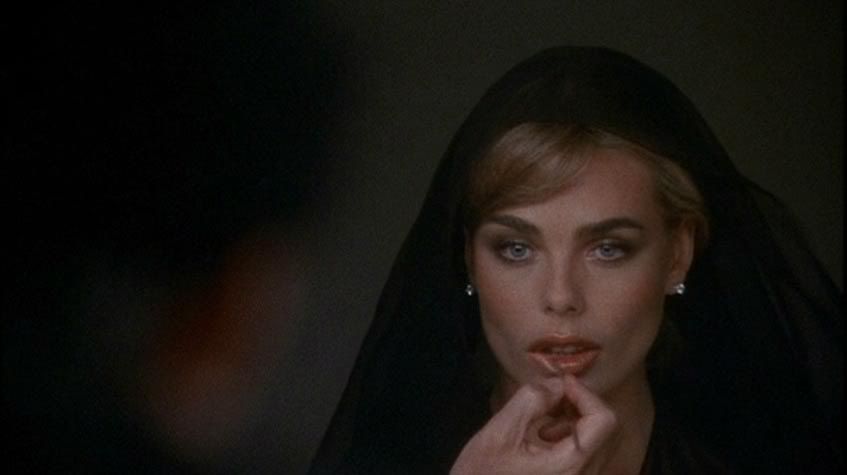
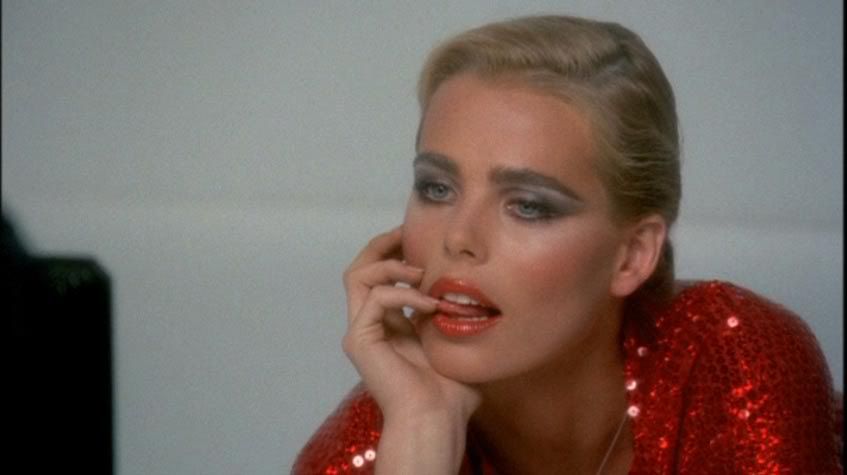
Chris McCormick (Margaux Hemingway) is a highly paid fashion model whose image serves as the driving force of the ad campaign for a popular brand of lipstick and can be seen in magazines and on billboards all around the world. No wonder then that Gordon Stuart (Chris Sarandon), a part-time composer and full-time music teacher, eagerly accepts Chris’ younger sister Kathy’s (Mariel Hemmingway) invitation to come to a secluded beachside photo shoot, so Chris can listen to some of his music. Unfortunately, Chris is too busy to give any of her time to Gordon and suggests that they meet another day at the apartment she shares with Kathy (following the death of their parents in a car accident). He agrees and shows up at the apartment at the date and time that she mentioned. Even though Chris has clearly forgotten about the invitation, she lets him in and politely sits down as he plays her a tape of one of his compositions. What she hears is a pretentious and ear-splitting combination of synthesized notes and bird calls, but she smiles as it plays and pretends to appreciate it until a phone call from her lover, Steve Edison (Perry King), thankfully interrupts them and allows her to escape to her room, away from the noise and its ever-so-slightly creepy creator.
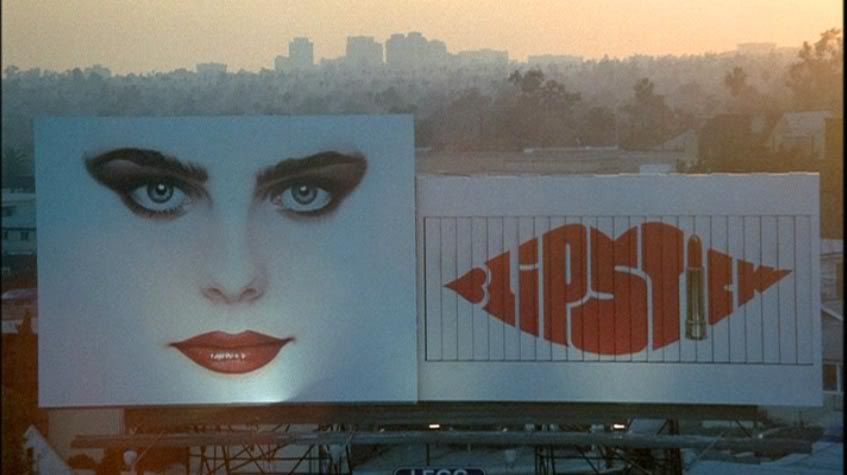
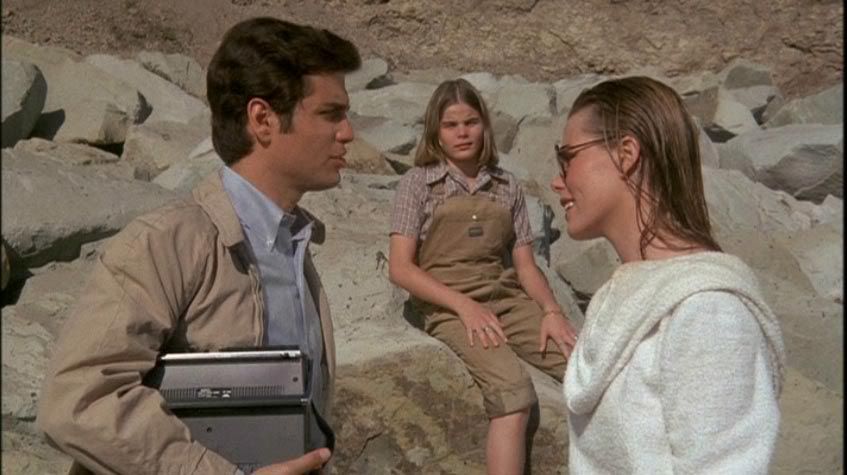
As Chris talks to Steve, a wounded Gordon begins to fume at the thought of Chris’ obvious condescension towards him. His hurt soon turns to anger and he enters her room and smashes a picture of her brother, a priest (John Bennett “Father of Matthew” Perry), before throwing himself on top of her. During her struggle to fight him off he slams her head against one of her bedposts and screams at her to show him where she keeps the lipstick her face and body sells to the public. When she tells him it is in her bathroom, he takes her there and smears it across her face before returning her to her bed, where he ties her down with silk scarves and sodomizes her.
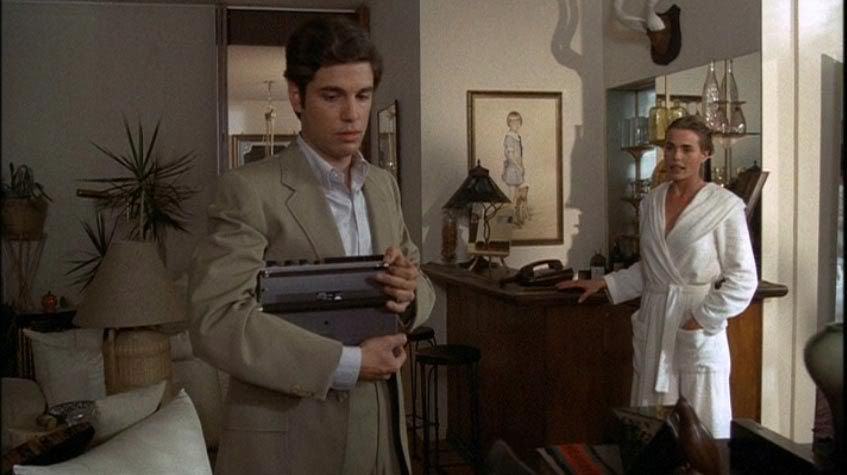
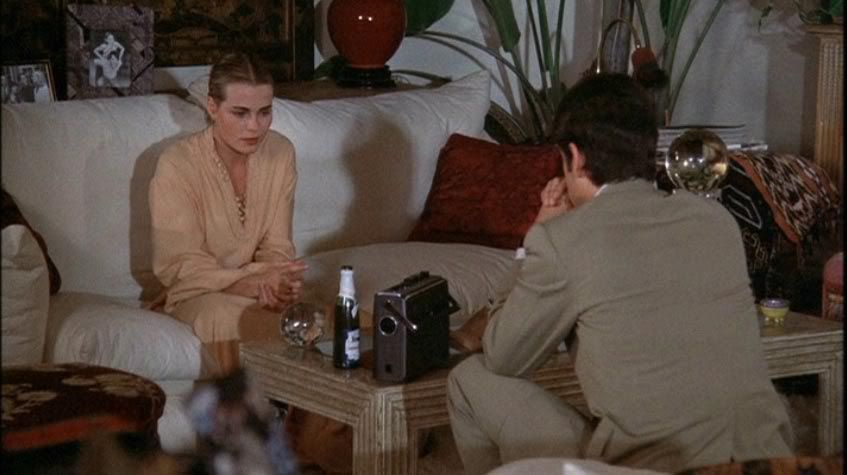
Near the end of Chris' terrible ordeal, Kathy returns home from school and walks in on her sister and the teacher she has a schoolgirl crush on together in bed—hurt and embarrassed she runs out before they see her and before she can tell what is really going on. Chris hears her leave and asks Gordon to untie her. He gets up and cruelly suggests calling Kathy in to join them and “Have some fun,” but he instead cuts her free and leaves. Chris gets up, finds Kathy and after telling her what really happened, calls the police.
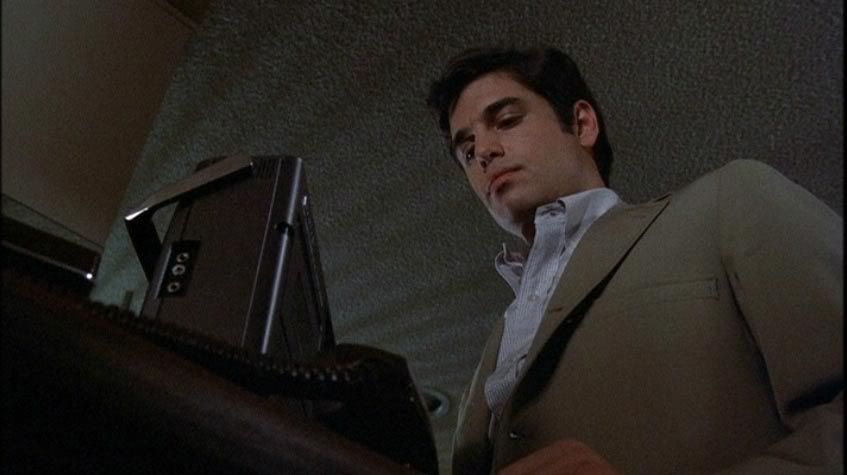
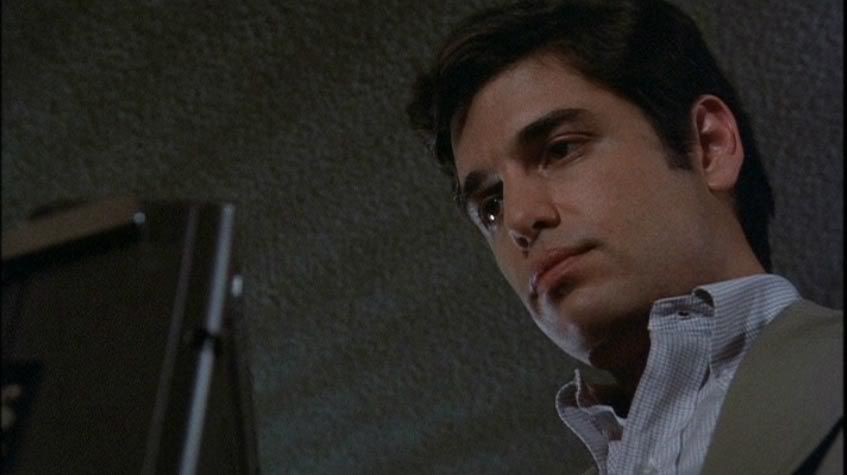
Gordon is arrested, but as Chris learns from Carla Bondi (Anne Bancroft) the weary prosecutor assigned to handle the case, his conviction is hardly a sure thing. Only two out of 100 rapists serve any jail time and only 10,000 out of the 50,000 rapes that occur each year in California are reported to the police. If Chris wants justice, she’ll have to testify and that could mean subjecting herself to a kind of abuse as terrible as the rape itself. Despite Steve’s fears of what a trial could do to her career, Chris agrees to testify passionately informing everyone in the room that she “…want[s} him to die in jail! I want them to do it to him in jail!”
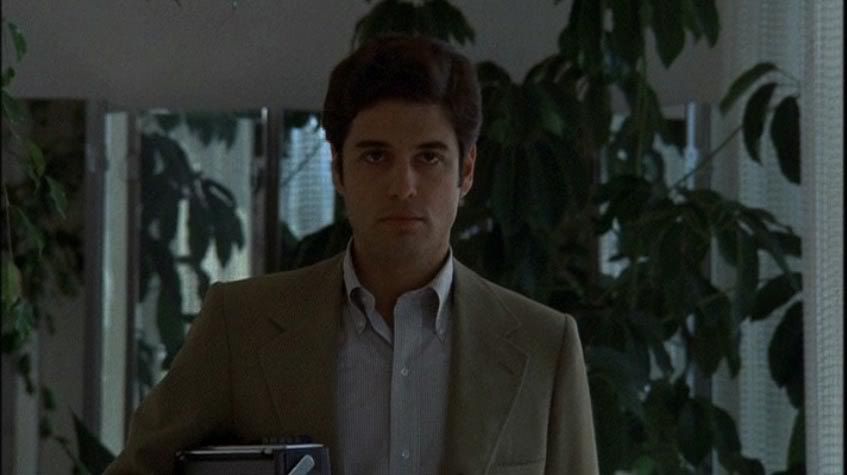

Unfortunately for Chris, Carla’s worst fears are all realized. Gordon’s sleazeball lawyer argues that the sex was consensual and its roughness was the result of Chris’ own twisted desires and not his client’s. He also suggests that even if Gordon acted without her consent, she provoked him by appearing naked in front of him at the photo shoot where they first met and by the inherent sensuality of the photographs from which she makes her living.
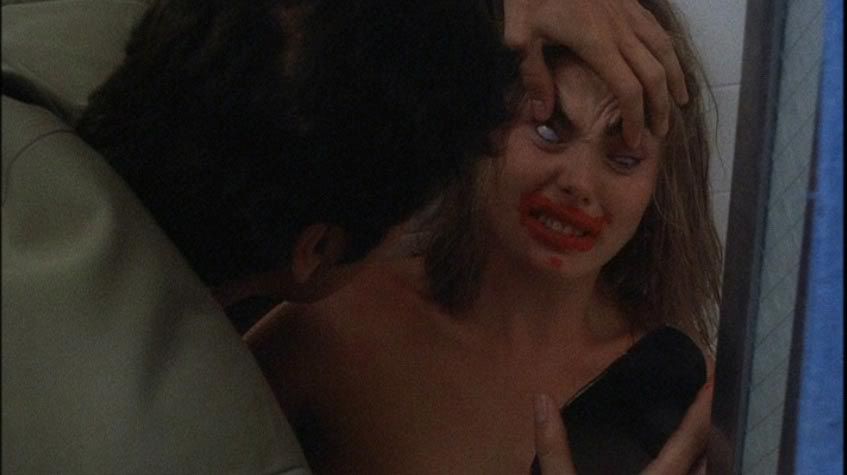
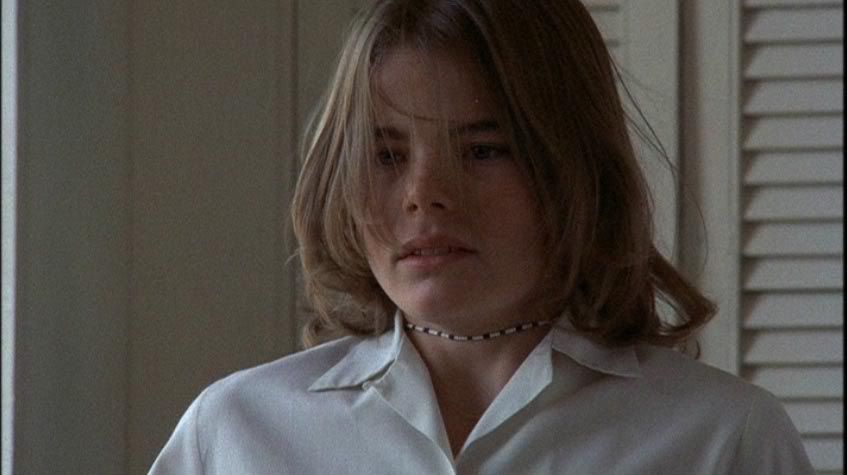
To Chris’ enormous shock, the credulous jury buys this logic and votes to acquit. Gordon walks out of the courthouse a free man. Not long after Chris learns that Steve, who works for the cosmetics company she poses for, has decided to “cool down” their ad campaign, meaning she has been abandoned by her boyfriend and is soon going to be out of work. Not knowing what else to do, she decides to move back to Colorado with Kathy as soon she finishes what is to be her last photo shoot.
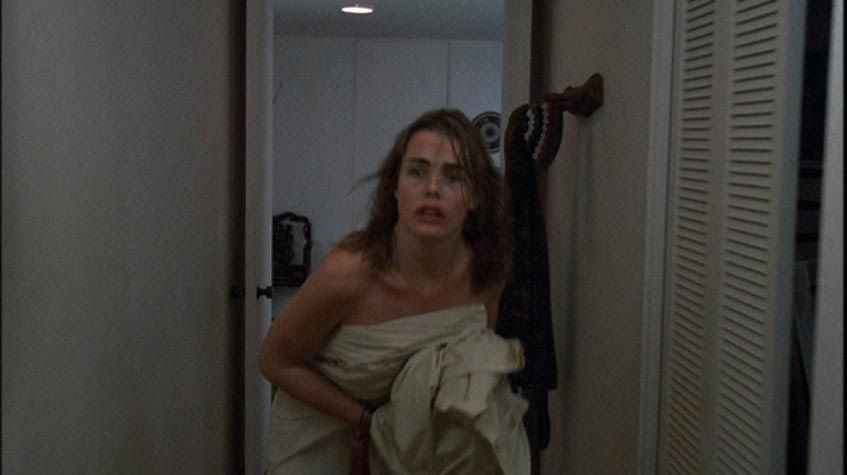
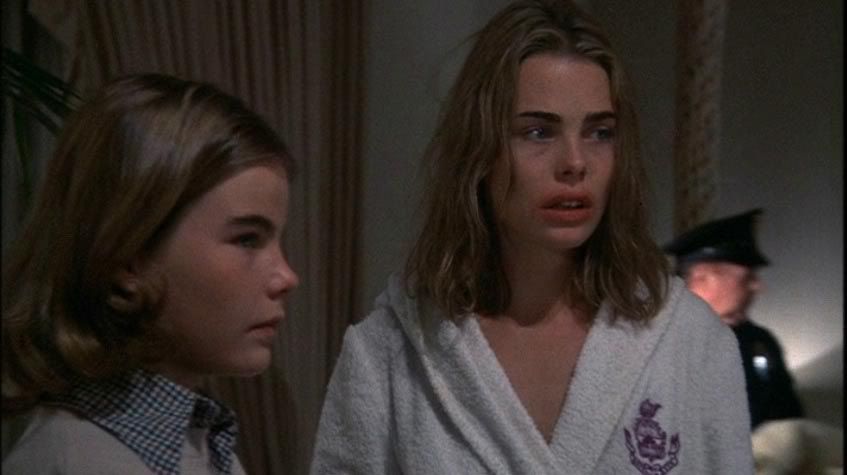
But by a terrible coincidence, Kathy’s old school is using the same building Chris’ shoot is in to rehearse the new ballet being orchestrated by their recently exonerated music teacher. As Chris poses in a red sequined gown she calls, “…the most beautiful dress I think I’ve ever had on,” Kathy runs into her old teacher, who—despite her protestations to the contrary—a part of her still believes is innocent of the crime her sister accused him of.
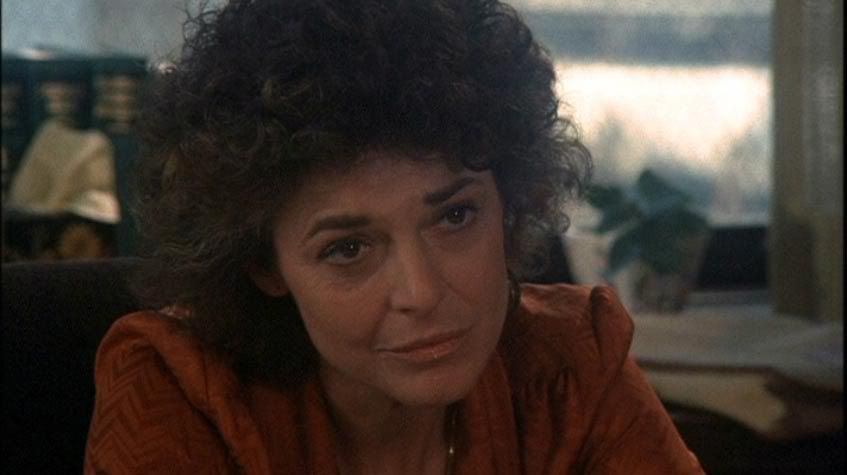
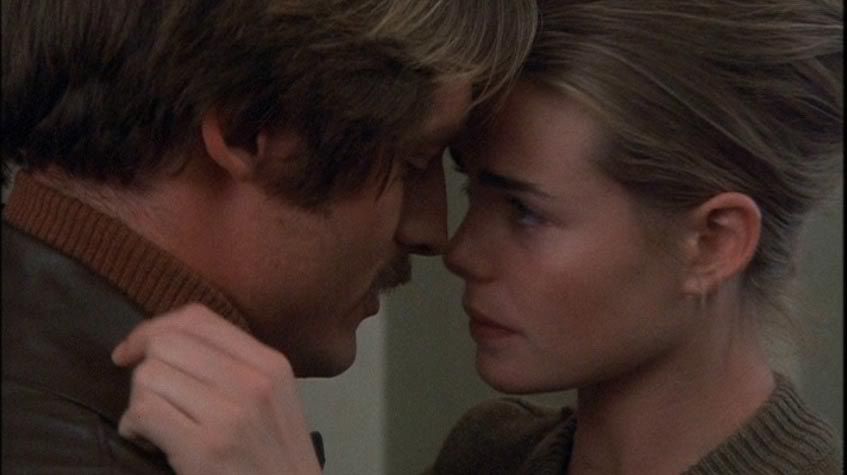
She soon learns, however, that her sister wasn’t lying when Gordon’s intentions become sinister and he starts chasing her throughout the nearly abandoned office building. Eventually he catches her and tears at her clothes and does something terrible to her off-screen.
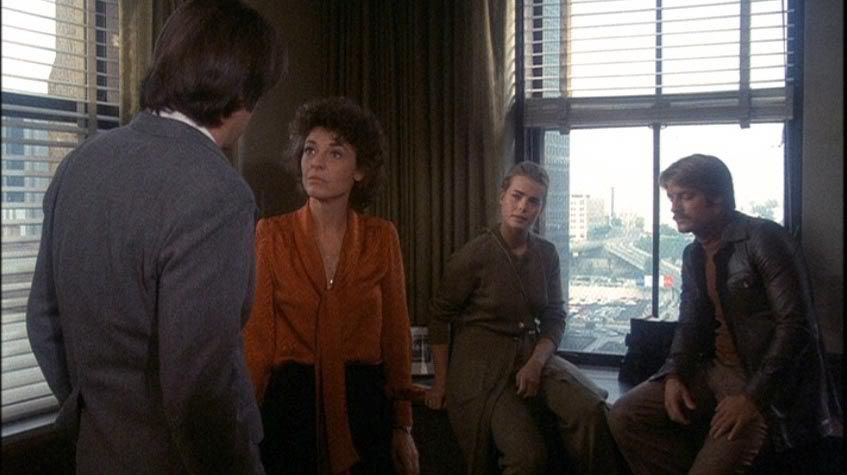
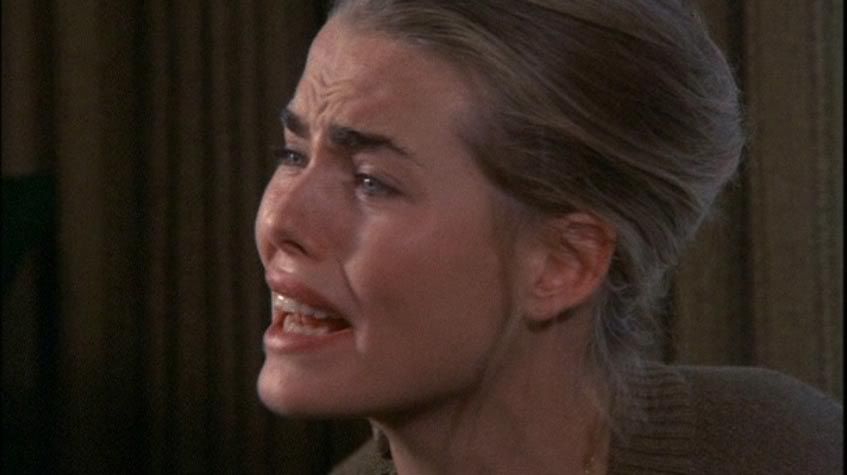
When he is done with her, Kathy stumbles back to the photo shoot and tells her sister what happened. Knowing she can’t trust the system to do what is right, Chris—still wearing the “beautiful” red gown—runs outside and grabs the shotgun she had intended to take to the mountains in Colorado. She then spots Gordon driving his car in the parking lot and shoots at it, causing him to turn it over on its side. When Gordon climbs out of the car, she shoots him repeatedly—so overcome with anger that she keeps pulling the trigger even after she has run out of bullets,
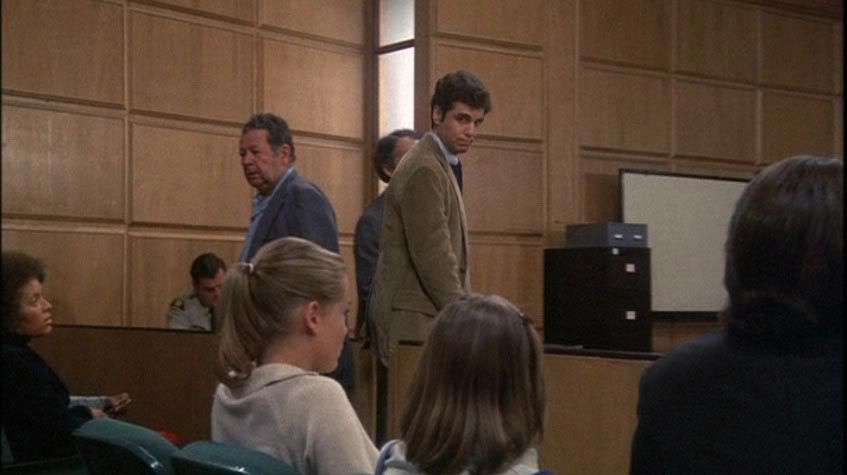
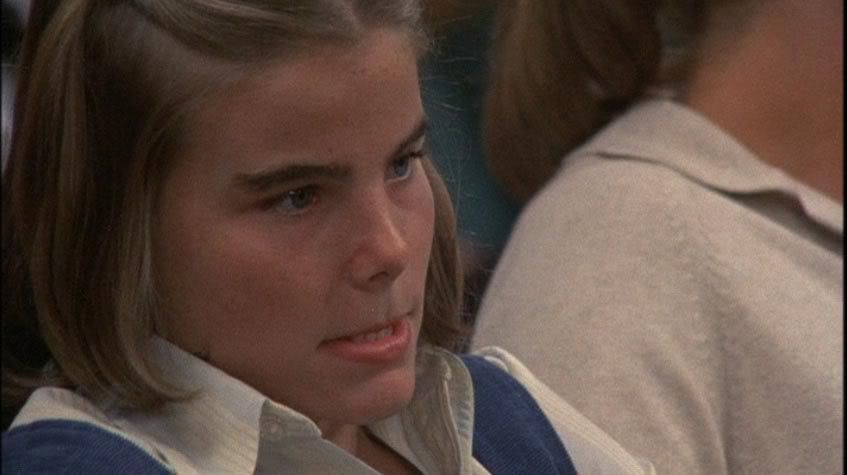
Within seconds the police arrive and arrest her. We then hear Carla Bondi’s voice as she speaks to a jury, informing them why they have to acquit Chris McCormick for the crime of murder (Bondi apparently having been so moved by Chris’ situation that she quit her job as a prosecutor to serve as her defense attorney). The film ends on a medium shot of Chris sitting in front of the jury as the foreman announces “We the jury find the defendant not guilty as charged.”
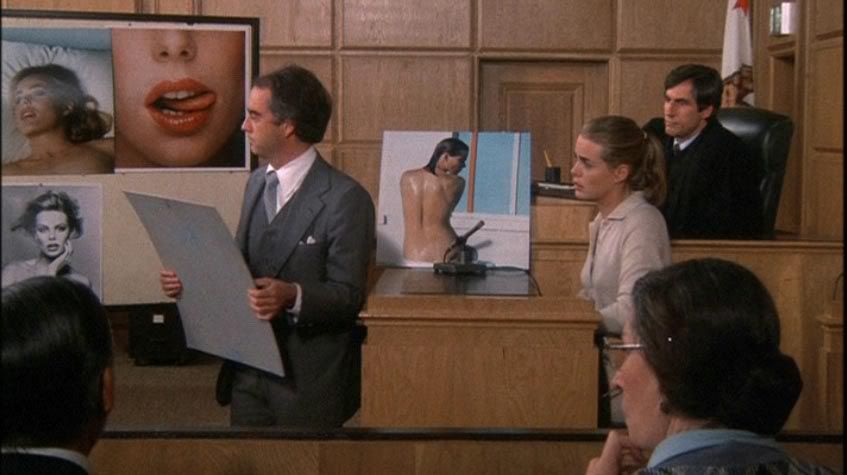
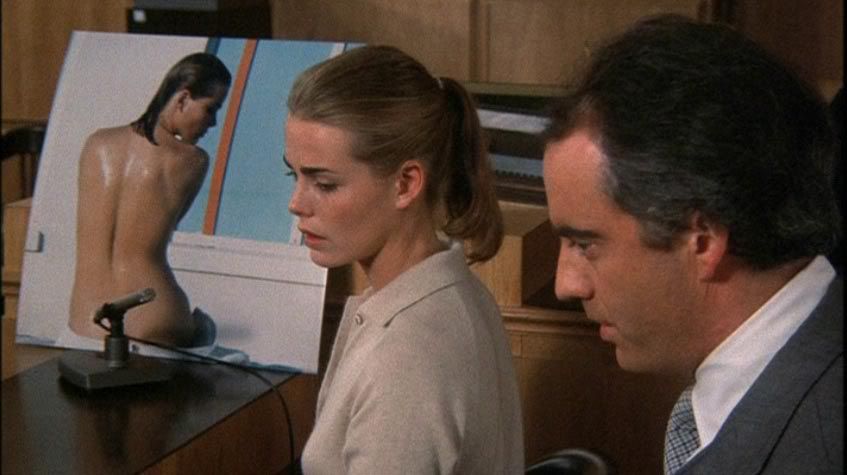
Okay, Lipstick is a bad movie, but I have to admit that after I watched it I had to spend some time figuring out why it was a bad movie as its flaws are more subliminal than obvious. Most reviewers seem to blame the film’s failure on Margaux Hemmingway’s performance, but the truth is that she does as good a job as a professional model with no previous acting experience could ever expect to do. Her biggest problem isn’t that she’s wooden or embarrassingly over-dramatic (like…say…Pia Zadora in The Lonely Lady) but instead that she possesses a speaking voice that—to my ears—makes her sound like a duck (one gets the very real sense that had she been a silent movie star, she would never have made the leap to talkies). It doesn’t help that she also clearly lacks the charisma of her then 14 year-old sister, who gives a fine juvenile performance that is only slightly marred by her inability to keep her tongue inside her mouth (note: I actually put together a photo-montage of every instance this odd acting choice of hers occurred, but I have elected not to post it because the result was…well…a lot less whimsical than I had hoped and more than a little creepy in a way that made me despair at the thought that there were people out in the world who would enjoy it in a way that would make me feel very wrong for having created it).
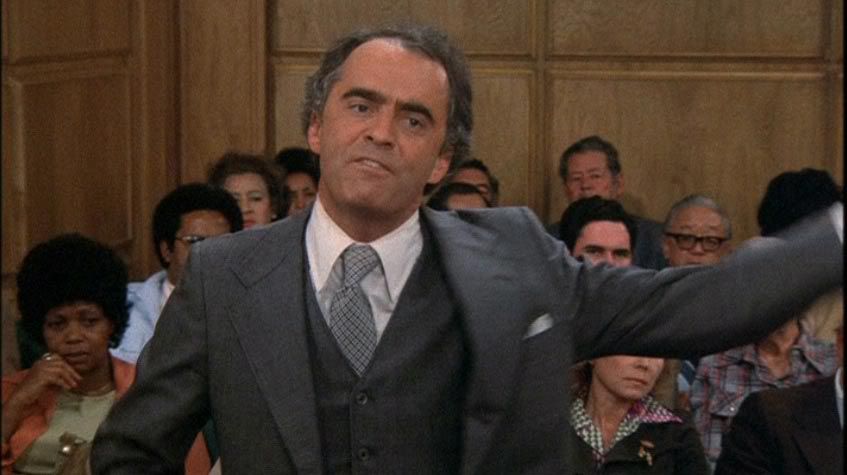

The rest of the cast also does the best they can with the material. Chris Sarandon plays an utter bastard better than pretty much anyone and almost manages to make us believe that his character’s metamorphosis from nerdy music teacher to psycho-rapist really does happen in the space of a couple of close-ups; Anne Bancroft, an Oscar winner and the original proto-milf, recites her didactic speeches about rape statistics and her many courtroom objections with conviction (even if her character fails to get one BADABUMP!); and Perry King (who himself will go the vigilante route six years later in the classic Class of 1984) sports a very nice mustache.
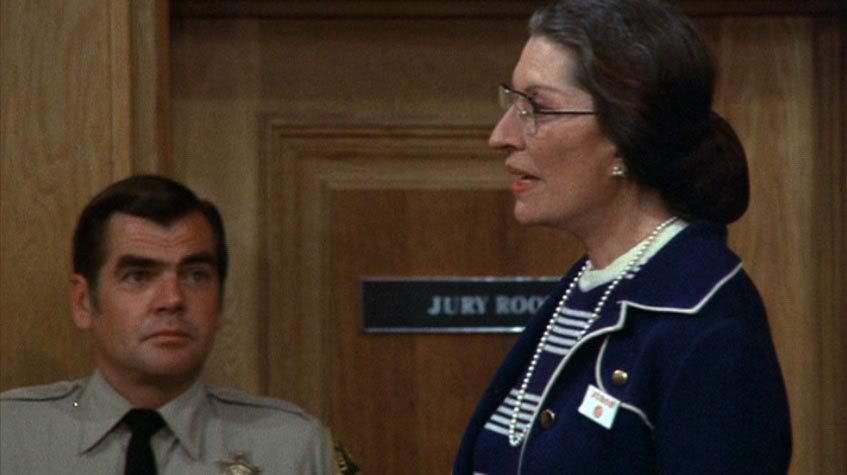
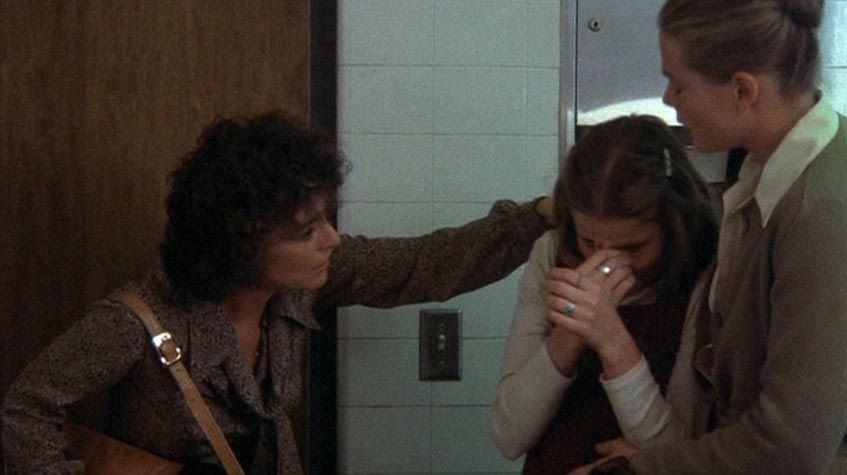
The film is also very well made on a technical level and is obviously the sole film of the four I plan on discussing that had an actual budget (although not a large one given its TV-movie-like reliance on only a small handful of cheap locations). Cinematographer Bill Butler (Jaws) succeeds at making the film look like the high-fashion magazine ads its main character poses for and does a good job convincing the audience that Margaux Hemmingway could have been a movie star in those moments where she has nothing to say. And it must be said that the film’s last 15 minutes (starting from Kathy and Gordon’s reunion and ending with his execution) are extremely well directed by Johnson and edited by Marion Rothman, but the tension, excitement and cathartic release they provide get to the heart of the problem that dooms the picture—it pretends as though it is a serious drama about the subject of rape (so much so that it credits three different technical advisers in its closing credits, two of whom--in a typical 70s touch--are male), when it is obvious that it was only made so we could see Margaux naked and then cheer along as we watch her blast holes in the rapist motherfucker.
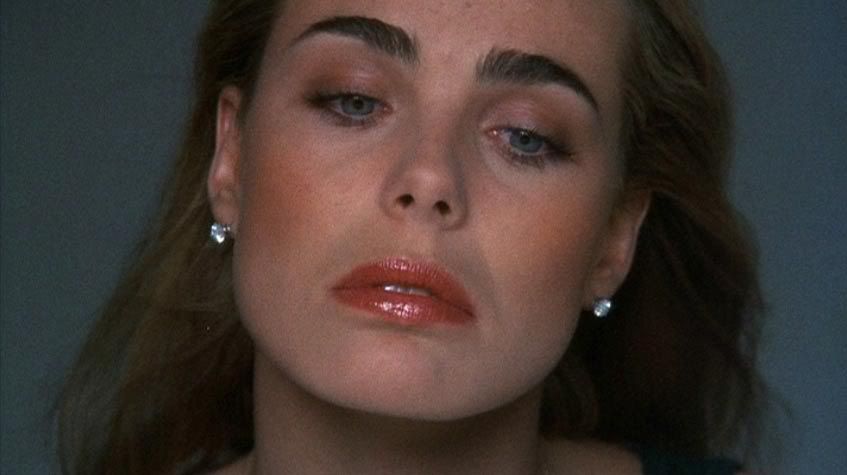

Lipstick is the worst possible kind of exploitation picture—a self-loathing one. Rather than acknowledge that its best and most exciting moments should be enough to justify its existence, it attempts to convince the audience that it isn’t simply an excuse to indulge in some melodramatic sex and violence by boring everyone with 40 odd minutes of tedious and superfluous courtroom drama. What its filmmakers don’t realize is that virtually every other film like it has managed to impart the same message as it does without standing there and shoving it into the audience’s noses while shouting “Do you get it? Do you get it?” over and over again.
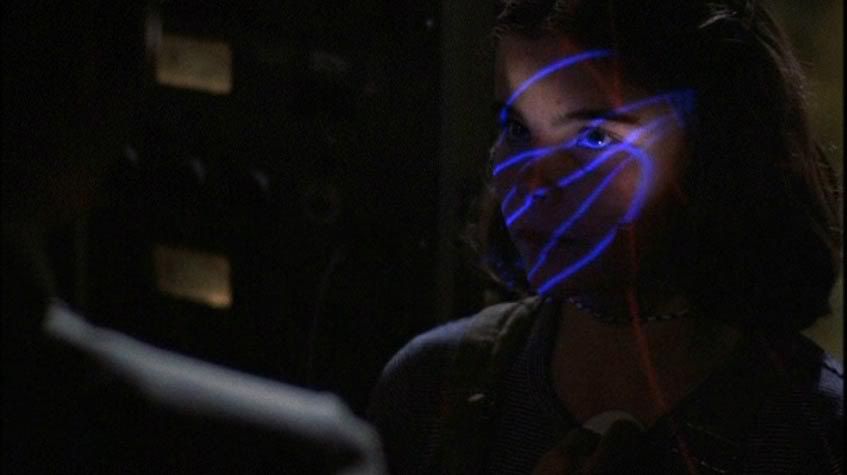
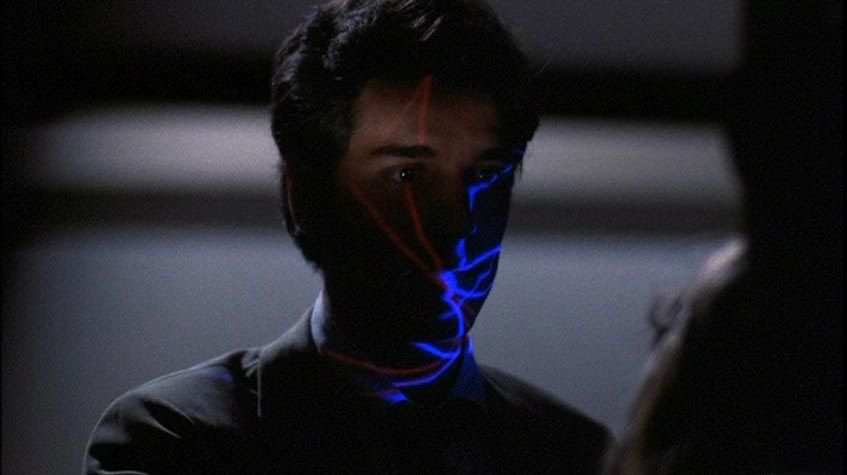
We get it, Lipstick. We really do.
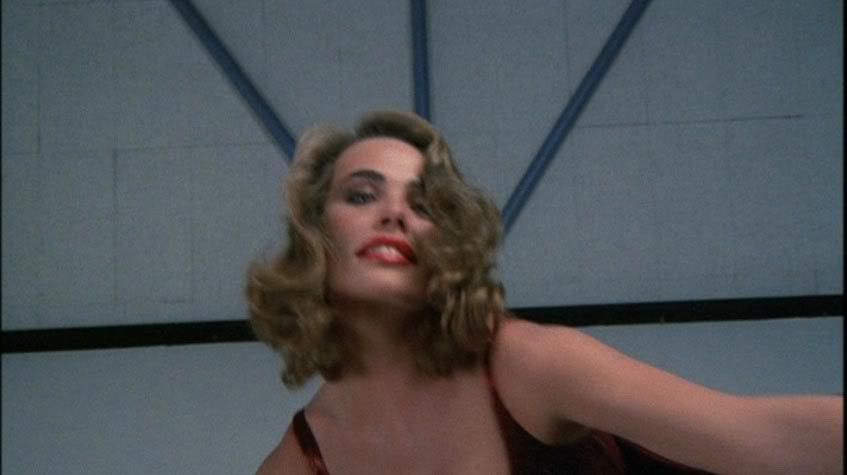
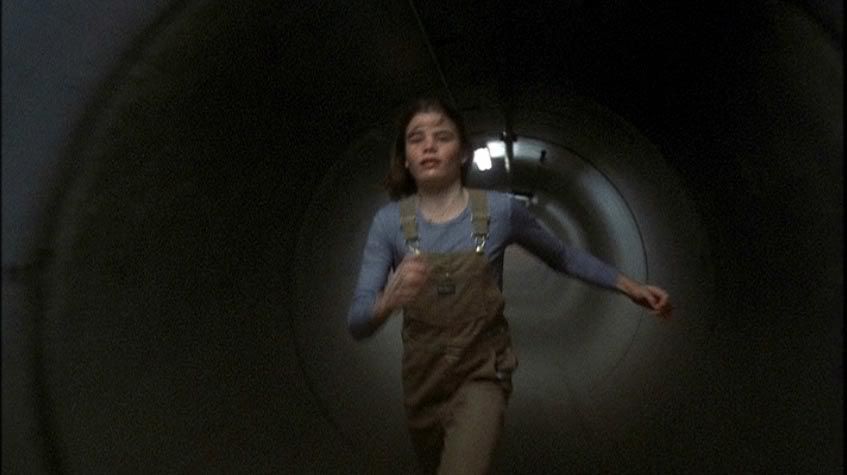
But, even worse, Lipstick proves that it lacks the courage of its own convictions by neutering the irony that might have actually given the film the depth it craved, even though doing so would have likely resulted in alienating audiences who demand satisfying resolutions for their entertainment.
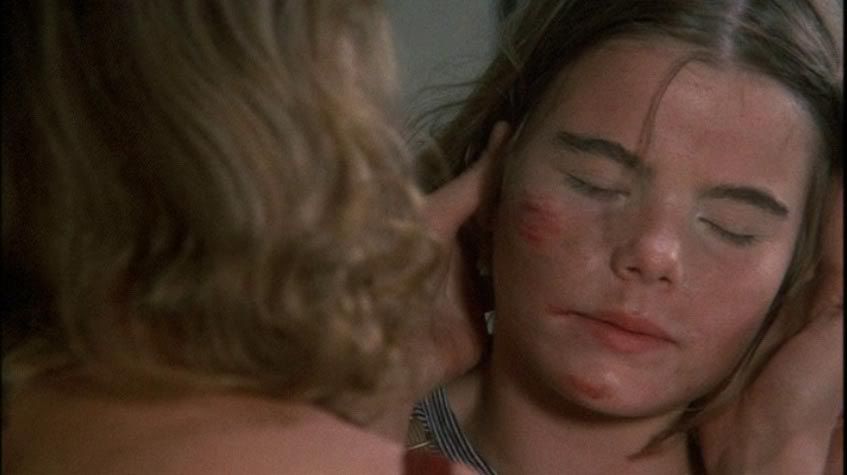

Most sophisticated viewers, upon watching the ending, will quickly conclude that it has been tampered with. The sign that will guide them to such a conclusion being that the verdict delivered by the jury’s foreman is given to us via voice-over, rather than on camera. It seems clear that the film originally ended with Chris’ fate in limbo as the credits rolled on a freeze-frame of her sitting in the same chair as her exonerated attacker—torturing the audience with the terrible irony that she might be convicted by the same system that allowed Gordon to go free. While this ending would not have been enough to justify the interminable boredom of its second-act, it would have been memorable enough to shock you into forgiving it. But my guess is that when this ending was first shown to an audience, the majority rioted at the thought that the poor model wouldn’t be freed and demanded that the ending be changed to match their own sense of karmic justice. Dino and the studio listened and gave the audience what they wanted in the quickest, cheapest way possible.
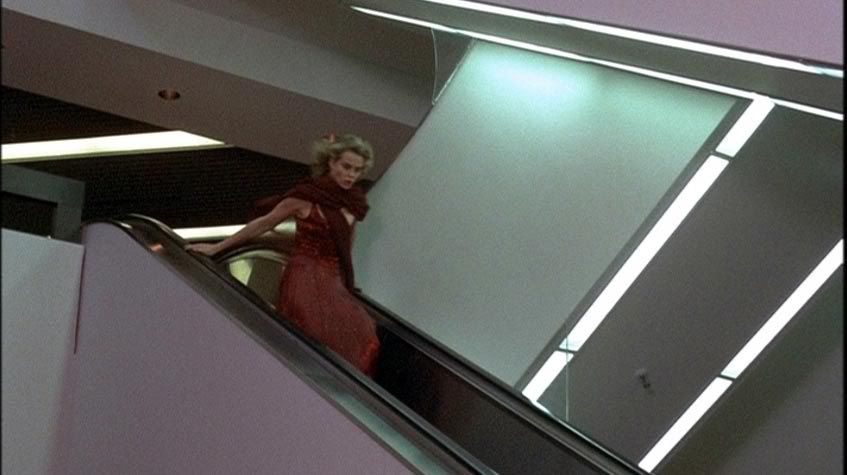
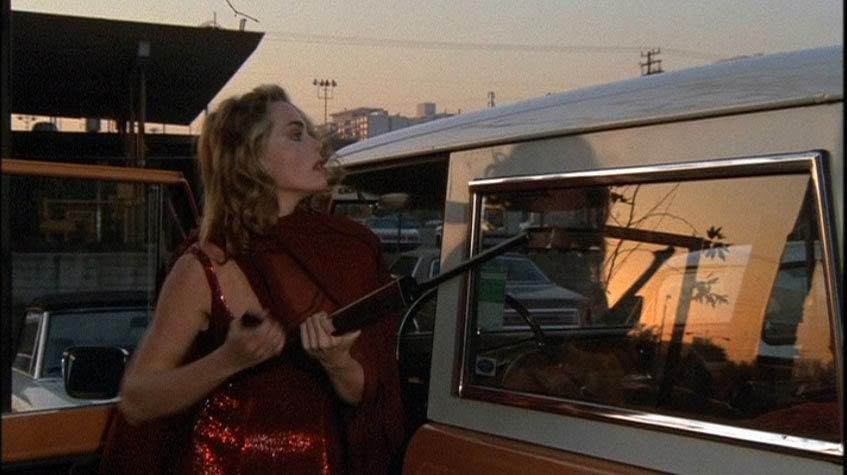
And it is this capitulation that proves that the producers cared more about satisfying the desires of the audience than the film’s overall message, which is why it is so sad that they didn’t just ditch the “important” stuff and just give us the sex and violence everyone really wanted in the first place, because when the film does work it works on a raw, visceral level that is genuinely exciting. If the first 70 minutes had the same primal spirit as the last 20, the result would have been a genuinely good cult film, rather than an amusingly bad one
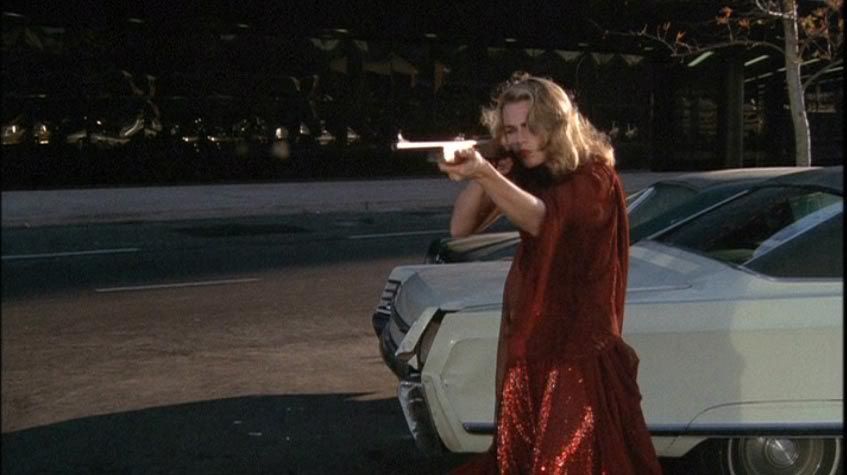
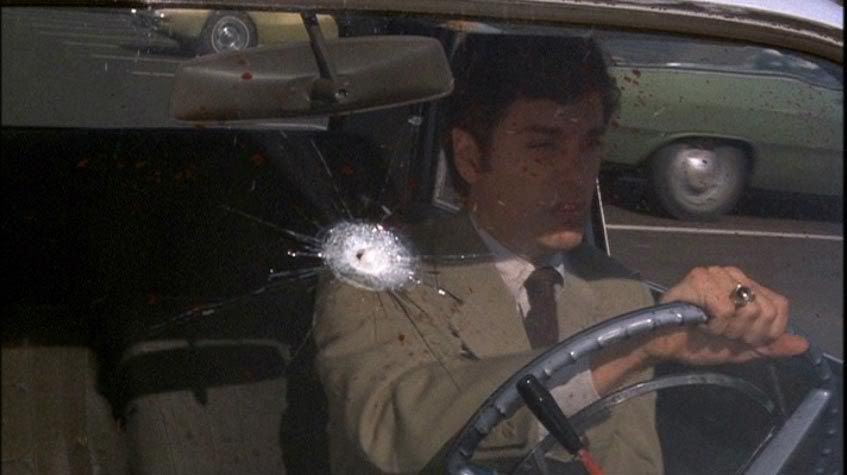
And to show you that I can actually come up with solutions instead of just pointing out problems, here’s how they could have made Lipstick into a kick-ass film:
ACT ONE: No real change, except I would direct Mariel to keep her goddamn tongue in her mouth!
ACT TWO: Instead of having Gordon’s trial take up the entire second act and the next forty minutes or so of the film, I would have it over and done with in five minutes. Chris says he did it, he says he didn’t, his lawyer calls her a slut, the prosecutor calls him a psycho, the jury acquits and we’re done.
ACT THREE: Same as the last 20 minutes of the film.
ACT FOUR: While her sister is on trial for Gordon’s murder, Kathy proceeds to claim the vengeance she feels they both deserve by killing his scumbag lawyer, the judge and the jury members who set him free, but in a much sneakier and less obvious way than her sister—who the police justifiably believe is the chief suspect behind the deaths. Not knowing about these other deaths, the jury for Chris’ trial votes to acquit. Free at last, she returns home only to find evidence that Kathy is the person killing all of the people responsible for Gordon’s release. To her horror she discovers that there is a 15th person on her sister’s list—Carla Bondi, the prosecutor who failed to win what should have been an open and shut case.
ACT FIVE: Chris rushes to rescue Carla from Kathy, only to discover that she’s too late and—worst of all—that the deranged 14 year-old has come to also blame her for what happened. Kathy attacks her and Chris accidentally kills her in self-defense. The police arrive and conclude that Chris killed both Carla and Kathy, as well as everyone else. The film ends with a jury agreeing with them and a judge sentencing Chris to life in prison without parole for crimes she did not commit.
ACT ONE: No real change, except I would direct Mariel to keep her goddamn tongue in her mouth!
ACT TWO: Instead of having Gordon’s trial take up the entire second act and the next forty minutes or so of the film, I would have it over and done with in five minutes. Chris says he did it, he says he didn’t, his lawyer calls her a slut, the prosecutor calls him a psycho, the jury acquits and we’re done.
ACT THREE: Same as the last 20 minutes of the film.
ACT FOUR: While her sister is on trial for Gordon’s murder, Kathy proceeds to claim the vengeance she feels they both deserve by killing his scumbag lawyer, the judge and the jury members who set him free, but in a much sneakier and less obvious way than her sister—who the police justifiably believe is the chief suspect behind the deaths. Not knowing about these other deaths, the jury for Chris’ trial votes to acquit. Free at last, she returns home only to find evidence that Kathy is the person killing all of the people responsible for Gordon’s release. To her horror she discovers that there is a 15th person on her sister’s list—Carla Bondi, the prosecutor who failed to win what should have been an open and shut case.
ACT FIVE: Chris rushes to rescue Carla from Kathy, only to discover that she’s too late and—worst of all—that the deranged 14 year-old has come to also blame her for what happened. Kathy attacks her and Chris accidentally kills her in self-defense. The police arrive and conclude that Chris killed both Carla and Kathy, as well as everyone else. The film ends with a jury agreeing with them and a judge sentencing Chris to life in prison without parole for crimes she did not commit.
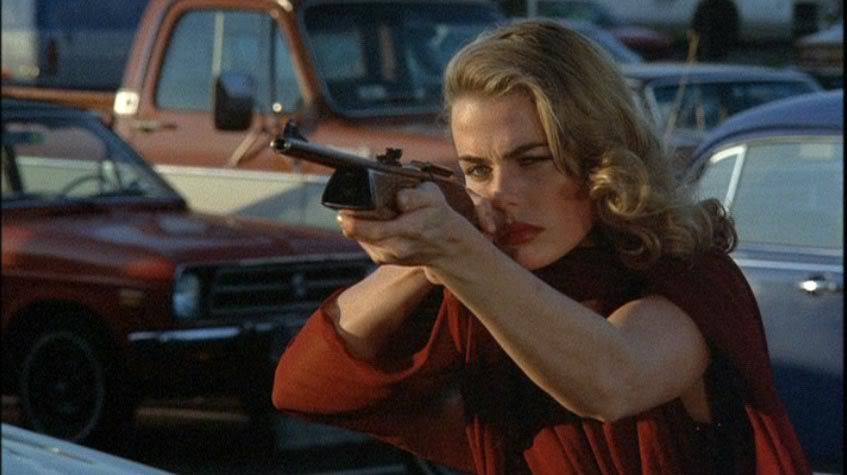
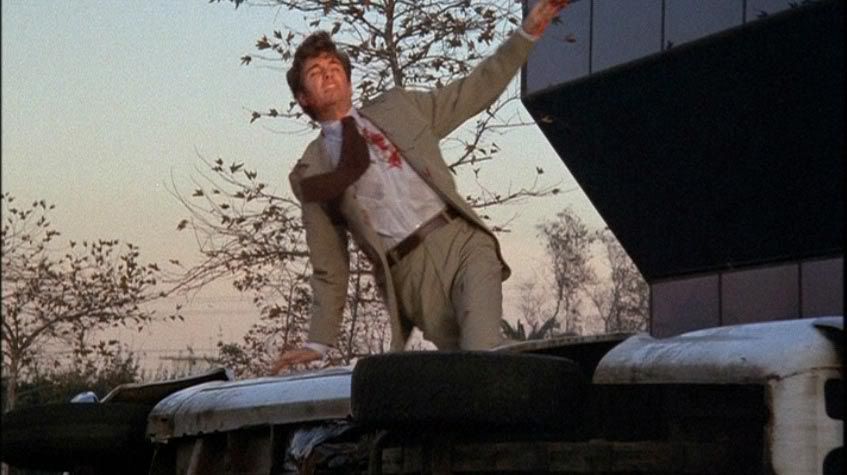
You see how easy it was to keep the good stuff and get rid of the junk? I guarantee you that there is not a dull moment to be found in my short treatment and it even ends on a more ironic note than the original was supposed to!
Man, I’m awesome.
Man, I’m awesome.
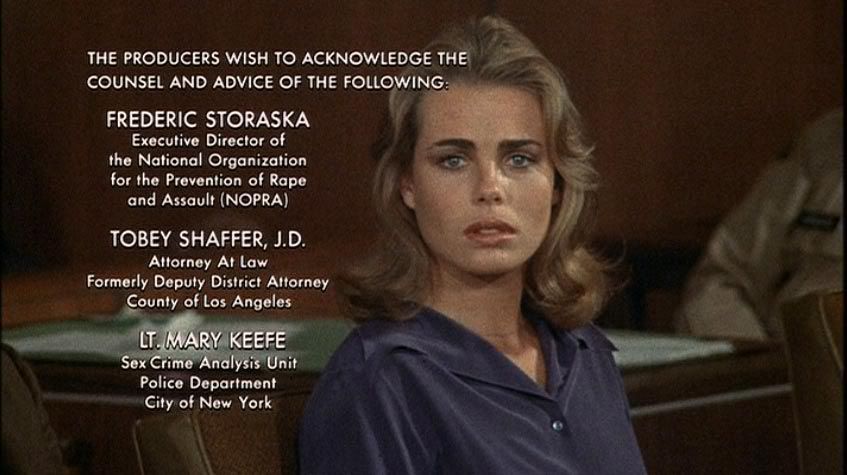
So, even more than “Being raped sucks!” the main message Lipstick leaves us with is that if a major Hollywood studio decides to make an exploitation move, they have to embrace the fact that they are twisted and evil and not attempt to assuage their guilt by compromising the product with cheap attempts to appeal to the kind of socially minded folks who are never going to accept the film no matter what they do.
In other words, if you’re gonna go—go hard.
Next Time When Sisters Do It For Themselves:
GOING HARD
GOING HARD

